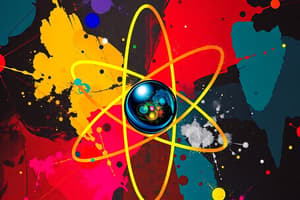Podcast
Questions and Answers
Which postulate is NOT part of Dalton’s atomic theory?
Which postulate is NOT part of Dalton’s atomic theory?
- Compounds are formed by combining atoms in fixed whole-number ratios.
- Atoms of the same element are identical in size and mass.
- Atoms can transform into different elements during chemical reactions. (correct)
- Atoms are indivisible and indestructible particles.
What law states that mass is neither created nor destroyed in a chemical reaction?
What law states that mass is neither created nor destroyed in a chemical reaction?
- Law of conservation of mass (correct)
- Law of definite proportions
- Law of atomic theory
- Law of multiple proportions
Which law is based on the concept that different compounds can be formed from the same elements in different ratios?
Which law is based on the concept that different compounds can be formed from the same elements in different ratios?
- Law of definite proportions
- Law of atomic stability
- Law of conservation of mass
- Law of multiple proportions (correct)
Which statement accurately reflects the modern atomic theory's perspective compared to Dalton's atomic theory?
Which statement accurately reflects the modern atomic theory's perspective compared to Dalton's atomic theory?
Which of the following combinations of postulates would best explain the law of definite proportions?
Which of the following combinations of postulates would best explain the law of definite proportions?
What term did Democritus use to refer to the smallest, indivisible particles of matter?
What term did Democritus use to refer to the smallest, indivisible particles of matter?
How did Plato and Aristotle's beliefs about matter differ from Democritus's view?
How did Plato and Aristotle's beliefs about matter differ from Democritus's view?
Which of the following concepts is a key part of Dalton's atomic theory?
Which of the following concepts is a key part of Dalton's atomic theory?
What is the significance of the law of definite proportions in relation to atomic theory?
What is the significance of the law of definite proportions in relation to atomic theory?
What was an early development in the understanding of atoms that contributed to the modern atomic theory?
What was an early development in the understanding of atoms that contributed to the modern atomic theory?
Flashcards are hidden until you start studying
Study Notes
Start-Up Activity
- Basic building blocks of substances include:
- Water: Composed of two hydrogen atoms and one oxygen atom (H2O).
- Chalk: Primarily made of calcium carbonate (CaCO3).
- Sugar: Composed of carbon, hydrogen, and oxygen (C6H12O6).
- Different materials exhibit unique properties due to variations in molecular structure, bonding, and arrangement, influencing their behavior like burning, cutting, or dissolving.
Unit 1: Atomic Theory Overview
- Study focuses on the historical development and evolution of atomic theory.
- Early evidence for atomic characterization includes experiments leading to atomic models and concepts like atomic mass and isotopes.
Historical Perspectives
- Ancient Greek philosophers debated the structure of matter:
- Plato and Aristotle believed matter was endlessly divisible.
- Democritus proposed that matter consists of tiny, indivisible particles called "atomos" (atoms).
Dalton's Atomic Theory
- Dalton's theory features five main postulates:
- All matter consists of atoms, which are indivisible.
- Atoms of a given element are identical in mass and properties.
- Compounds are formed by the combination of different atoms in fixed ratios.
- Chemical reactions involve the rearrangement of atoms, not their creation or destruction.
- Atoms can neither be created nor destroyed in a chemical reaction.
Laws Related to Dalton’s Theory
- Law of Conservation of Mass: Mass is neither created nor destroyed in chemical reactions.
- Law of Definite Proportions: A chemical compound always contains the same proportion of elements by mass.
- Law of Multiple Proportions: When two elements form multiple compounds, the masses of one element that combine with a fixed mass of the other can be expressed as a ratio of small whole numbers.
Postulates of Modern Atomic Theory
- Modern atomic theory builds upon Dalton's ideas but incorporates findings that refine or contradict certain postulates.
- Key developments include the discovery of subatomic particles, like electrons, by J.J. Thomson in 1897.
Evolution of Atomic Theory
- Scientific theories evolve as new experiments provide evidence that refine previous understanding.
- Dalton's model remains foundational, illustrating the simplicity of atoms and their interactions despite later discoveries that complicate this view.
Studying That Suits You
Use AI to generate personalized quizzes and flashcards to suit your learning preferences.




